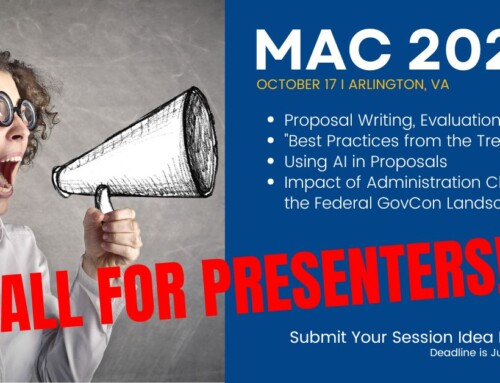This article is a re-print of one that appeared in our 2016 Spring issue.
Proposal response teams are entirely what your company makes of them. A good team can successfully swing at the opportunities for which you prepare them. A great team can take the ones you knew about and the ones you didn’t see coming and still increase your win rate.
New proposal writers can be trained, so I am always looking for great writers. With the right development and mentoring, proposal writers will not only make your proposals read like novels (rather than manuals), they will highlight the strengths and features of your offer to your customer, focus your Subject Matter Experts (SMEs) on the best solution, and help the entire proposal team answer the “so what?” aspects of your offer. Source Selection Boards aren’t made up entirely of SMEs. To appeal to both the engineers and the executives, good writers break down very technical concepts into accessible language and benefits to the customer.
 I came up “through the ranks” as a fresh-out-of-college proposal writer and learned quickly that research and asking the right questions is critical. In the roles where I have had proposal writers supporting me, they are responsible for writing every word — including technical sections. That way, the message is consistent through every sentence and has one-voice.
I came up “through the ranks” as a fresh-out-of-college proposal writer and learned quickly that research and asking the right questions is critical. In the roles where I have had proposal writers supporting me, they are responsible for writing every word — including technical sections. That way, the message is consistent through every sentence and has one-voice.
How do you develop proposal writer potential? In the beginning, it takes a lot of time and patience. As a proposal manager, I review every iteration of a proposal, and those first few proposals your new writers work on will require careful review and specific suggestions. Don’t rewrite it, however tempting that may be. People learn by doing, so after initial training, you need to let them fly. Ask pointed questions, suggest specific places to find information, and most of all, be constructive. Comments such as, “This is not how we do this,” or, “This is all wrong,” are not helpful, and won’t encourage learning. I tend to ask questions back to my writers and guide them to answering their own questions. While reviewing, be sure to also point out what they did well so they know to repeat it. Think of it like the improv approach: “Yes, and -,” rather than “No.”
Encourage Growth
Are you a cybersecurity shop? Point your writers to the Defense Information Systems Agency (DISA) Information Assurance Support Environment (IASE) Online Training Catalog (e.g., CyberAwareness Challenge). Get everyone on your team IT Infrastructure Library (ITIL) Foundations training. Once new writers feel less overwhelmed by the alphabet soup that is government contracting, it is critical they learn the other lingo in your industry. Being in a room where everyone else appears to know what they’re talking about and throws around terms they assume everyone else knows is almost numbingly overwhelming (been there, done that).
Take time to explain concepts and proposal basics, and understand that it will take some repetition for it to sink in. I can’t stress enough how important it is to be available. Take time out of your day. Spend time working in the same room so everyone is accessible to answer questions. Draw things out, make connections if necessary, but try to let the writers make the connections themselves, and then reaffirm them. Once writers get their feet wet, send them out of the office. Encourage them to attend conferences, industry days, and local trainings. Grow your people.
Encourage Research
Research works in conjunction with capture. Great writers can pull the best out of your whole offer; they need to understand the basics to achieve this. There are two major research areas: customer and technical. For totally new topics, I start with something like Wikipedia, just to get a handle on what it is I’m talking about. Find keywords; see how they interact with the main topic. Encourage writers to use every resource available. Keep in mind, your role shifts slightly to professor in these cases when you’ll need to verify the writer’s research.
Look for videos, images, and blog posts. Forums, when used effectively, can even get into the technical details of why your company has chosen Technology X over Technology Y, providing the benefit of Technology X to your customer. Strategic plans are great starts to see if you can connect the scope of work with the customer’s future goals. FAQ pages, CIO bios, and conference recordings are also good sources of information. The more writers understand the customer and your company’s technical approach, the better the whole proposal will be. Giving your writers the tools they need to write with a basic level of understanding is key to putting together quality proposals.[intense_blockquote width=”33%” rightalign=”1″]I can’t stress enough how important it is to be available. Take time out of your day. Spend time working in the same room so everyone is accessible to answer questions.[/intense_blockquote]
Encourage Questions and Interviews
Quality research can take you far, but it won’t take you all the way. Developing writers who can successfully interview your company’s SMEs will help you get more input and details for a winning bid. Interviewing technical people is a great life skill, but difficult to learn. Make sure you are involved in these interviews, and prepare both the writer and the SME. Communicate expectations, scope of work, and results you are hoping to get out of the interview. It’s helpful to frame questions in simple language (as opposed to proposal language) and respect everyone’s time. For example, asking “why is this solution more effective?” will get you more than “ but why is this solution better for this customer?” Ask SMEs to describe their roles step-by-step, put a process on it, get them to brag, and explain how they would depict it visually. Encourage your writers to push and get what they need. Encourage confidence.
Building a successful proposal response team requires careful consideration of your company’s approach to proposals. Clear expectations, dedicated mentoring, and professional development will allow your writers to exceed your expectations.




Leave A Comment